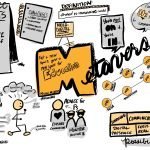By Micah Miner, originally published in Equity & Access
I remember delivering papers every day after school as a middle school kid, listening to my new Discman in the early 1990s. It was a terrific way to get some money, especially during winter break, where the tips I received were big cash for a young kid. It also helped that I had inherited the paper route from my older brother, and he had a good reputation that I also inherited. I would eventually pass it down to my younger brother. The neighborhood knew me and my family. My dad was a long-time middle school teacher and my mom, who was also former teacher, ran a childcare out of our house in the small town I grew up in. We were also a part of a large church for the area.
In my hometown bubble I felt known, understood, and safe. In addition, my parents had adopted two Korean siblings who were older than me. They were into having a diverse family and wanted us to love all humanity in our world. My history lessons were mostly about me and people like me, Eurocentric and based on the white American experiences, with some sampling of African American history since the demographics of my town was about 30% African American. I felt comfortable, but I was already an avid reader and into different perspectives, which were encouraged by my family. They also encouraged me to be a critical thinker and to always learn from others.
It was on my paper route where I first listened to Rage Against the Machine’s first album. The song titles, including “Killing in the Name Of,” “Know Your Enemy,” “Freedom,” “Wake Up,” and others, were mind-blowing and eye-opening, not to mention it was the first time I was listening to an album with so many explicit lyrics. At the time, my parents were unaware of the album and its contents, but I started questioning every history lesson after hearing it. The most impactful song for my future as a history educator and now a district administrator whose responsibilities include overseeing social studies came from their song “Take the Power Back.”
It is important to note that as a professional adult, I do not agree with the explicit language and statements that the band’s sound and lyrics call for or condone extreme actions people may take from the lyrics. What I do want to point out is that the song’s critique about the curriculum we teach in U.S. history in many places throughout the country is at the very least an incomplete one, and at worst we commit educational history malpractice by teaching false or misleading history. The rage against a single narrative Eurocentric history focus that was being taught in schools was profound, and the band displayed their rage of this simplistic and unbalanced historical approach through the band’s vocals, guitars, and drums. It was a palpable feeling of mistrust, defiance, and feeling ignored, unrecognized, and ultimately unheard to the curriculum being taught, and this lack of acknowledgement of the pain, violence, and conflicts that has been inflicted on groups of non-European heritage across the past 400 years of well-documented colonial expansion, cultural genocide, and a slavery-ridden past. This is the message that is completely understood from the song lyrics and across other groups in our society, and it needs to be addressed.
History is full of these different narratives, perspectives of oppression, wars, conflicts, genocide, and violence between European groups, and European and non-European groups, and a plethora of these primary and secondary resources is both accessible and well-documented. As I grew up, I learned more about these competing historical narratives in my own personal study.
Much of these histories are not taught in schools at all. I could fully understand the reasons why the band was so angry, since it is true that these diverse factual stories and narratives have almost always been ignored over the years of history and social studies instruction. The band’s cultural heritage includes Mexican American, biracial with both Kenyan and White background, among others. It is also true that the guitarist, Tom Morello, has a social studies degree from Harvard and his mother was a social studies teacher.
Imagine going to history class every day and you and your family’s stories, struggles, and triumphs are never mentioned, or if they are it is in a disparaging or condescending way.
This anger the band members experienced as students is a critique that I think should have been taken seriously back then in the 1990s. For years it seemed like educational scholars, policymakers, and instructional designers were listening and there was a large push for a more inclusive curriculum, including multiple voices and perspectives, and research into finding the cultural narratives and stories that were more representative of our larger democracy, especially as we are becoming more multicultural and now there are more non-white students in our public schools curriculum than white, so it was expected that this shift would continue. Then, it surprisingly and jarringly stopped and reversed course.
The past few years have seen an extreme uptick and shift back to more Euro-centric views, false or incomplete narratives of U.S. (United States) history, and book banning in libraries and schools, designed to silence multicultural and more inclusive approaches to teaching U.S. history in various places across the country. This was culminated in two particularly important news stories last spring the College Board backing down to Florida’s political pressure over there AP (Advanced Placement) African American History pilot class, and the NAEP (National Assessment of Educational Progress) report on how our students are performing at historically low levels in history and civics.
Another recent summer example is the newly adopted Florida standards benchmark for middle school students found in SS.68.AA.2.3, which states as a benchmark clarification, “Instruction includes how slaves developed skills which, in some instances, could be applied for their personal benefit” (Florida Department of Education, 2023).
Obviously, we are in a historical and civics educational crisis that needs to be addressed. Nobody is saying that there should be zero European American representation, which is not what is being recommended. Instead, we need to take a more wholistic and broad representation of balanced histories. After all, we are the most diverse country in the world, and the histories that we teach in the curriculum should also show that diverse representation.
Over the years, the battlefield of social studies has been beset by the crossfire of political ideologies, leading to a historical narrative that’s often sterilized, whitewashed, or skewed toward a singular perspective. This unilateral viewpoint limits the narrative, omits various experiences, and hampers the mission of education to foster critical thinking.
The band’s anthem, “Take the Power Back,” resonates even more strongly in this context, serving as a rallying cry for social studies reform. To heed this call is to fight for a narrative that doesn’t shy away from hard truths and injustices, one that fosters critical thinking by painting a comprehensive picture of how past events have shaped the present and will influence the future. We must prioritize diversity, inclusion, and social justice, amplifying silenced voices to enrich our collective understanding.
Authentic social studies are not about rote memorization. We need to equip students with the tools to connect the dots between past and present, understanding and critiquing the status quo. Our curriculum must recognize and celebrate the diverse experiences of indigenous communities, women, immigrants, Black, Brown, and Asian American communities, and LGBTQ+ individuals, as their stories form an integral part of our nation’s history. We cannot overlook the living testaments of different perspectives documented in primary and secondary sources — that would be educational malpractice.
Empowering educators is vital to this transformation. They need resources, training, and support to navigate nuanced discussions. Empowered educators foster empowered students, promoting curiosity, critical thinking, and empathy. Omitting histories and perspectives undermines learning and divides society.
Reclaiming the narrative and “taking the power back” in our classrooms is a daunting task amidst dissenting voices. Yet Rage Against the Machine’s urgent cry of “No more lies” cannot be ignored. As we strive for diversity, equity, and inclusion, we must remember the classroom is the frontline. By fostering a comprehensive and diverse curriculum representation, we shape future generations to build a just society.
To those already fighting, keep going and don’t give up. To those wavering, take a stand. To those unaware, open your eyes and join the movement to reclaim authentic narratives for the next generation. The road ahead involves pressures and resistance. Yet the call to “take the power back” is more crucial than ever — a call to reimagine social studies as a subject encouraging discourse, analysis, and empathy. As we strive for justice, let us remember the classroom is the battleground. By promoting inclusive curriculums, we “take the power back,” equipping students to build an equitable society.
Reference: Florida Department of Education. (2023). Florida’s State Academic Standards – Social Studies, 2023. Retrieved from https://www.fldoe.org/core/fileparse.php/20653/urlt/6-4.pdf
Micah Miner serves as the District Instructional Technology & Social Studies Coordinator at Maywood, Melrose Park, Broadview School District 89. He believes equity matters, not just globally, but locally and all students deserve equity and access in education and life. Micah has served as a teacher in K-12 settings in both regular classrooms and alternative schools, as a social studies department chair, instructional technology coach, adjunct professor in social studies and instructional technology, and as a school and district administrator. He can be reached on social media @minerclass on Twitter, his LinkedIn profile here, and his email micah.miner@maywood89.org.
- Micah Minerhttps://ace-ed.org/author/mminer/
- Micah Minerhttps://ace-ed.org/author/mminer/
- Micah Minerhttps://ace-ed.org/author/mminer/
- Micah Minerhttps://ace-ed.org/author/mminer/







